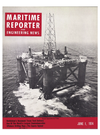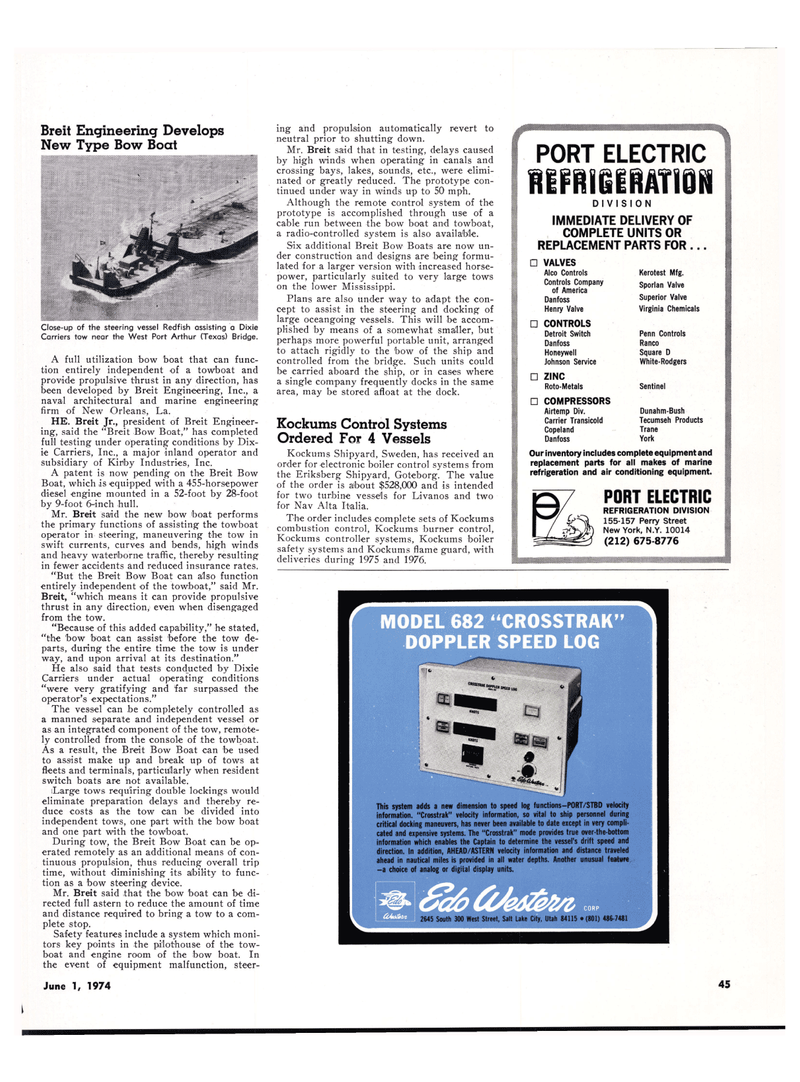
Page 44: of Maritime Reporter Magazine (June 1974)
Read this page in Pdf, Flash or Html5 edition of June 1974 Maritime Reporter Magazine
Breit Engineering Develops
New Type Bow Boat
Close-up of the steering vessel Redfish assisting a Dixie
Carriers tow near the West Port Arthur (Texas) Bridge.
A full utilization bow boat that can func- tion entirely independent of a towboat and provide propulsive thrust in any direction, has been developed by Breit Engineering, Inc., a naval architectural and marine engineering firm of New Orleans, La.
HE. Breit Jr., president of Breit Engineer- ing, said the "Breit Bow Boat," has completed full testing under operating conditions by Dix- ie Carriers, Inc., a major inland operator and subsidiary of Kinby Industries, Inc.
A patent is now pending on the Breit Bow
Boat, which is equipped with a 455-horsepower diesel engine mounted in a 52-foot by 28-foot by 9-foot 6-inch hull.
Mr. Breit said the new bow boat performs the primary functions of assisting the towboat operator in steering, maneuvering the tow in swift currents, curves and bends, high winds and heavy wateriborne traffic, thereby resulting in fewer accidents and reduced insurance rates. "But the Breit Bow Boat can also function entirely independent of the towboat," said Mr.
Breit, "which means it can provide propulsive thrust in any direction, even when disengaged from the tow. "Because of this added capability," he stated, "the bow boat can assist before the tow de- parts, during the entire time the tow is under way, and upon arrival at its destination."
He also said that tests conducted by Dixie
Carriers under actual operating conditions "were very gratifying and far surpassed the operator's expectations."
The vessel can be completely controlled as a manned separate and independent vessel or as an integrated component of the tow, remote- ly controlled from the console of the towboat.
As a result, the Breit Bow Boat can be used to assist make up and break up of tows at fleets and terminals, particularly when resident switch boats are not available.
Large tows requiring double lockings would eliminate preparation delays and thereby re- duce costs as the tow can be divided into independent tows, one part with the bow boat and one part with the towboat.
During tow, the Breit Bow Boat can be op- erated remotely as an additional means of con- tinuous propulsion, thus reducing overall trip time, without diminishing its ability to func- tion as a bow steering device.
Mr. Breit said that the bow boat can be di- rected full astern to reduce the amount of time and distance required to bring a tow to a com- plete stop.
Safety features include a system which moni- tors key points in the pilothouse of the tow- boat and engine room of the bow boat. In the event of equipment malfunction, steer- ing and propulsion automatically revert to neutral prior to shutting down.
Mr. Breit said that in testing, delays caused by high winds when operating in canals and crossing bays, lakes, sounds, etc., were elimi- nated or greatly reduced. The prototype con- tinued under way in winds up to 50 mph.
Although the remote control system of the prototype is accomplished through use of a cable run between the bow boat and towboat, a radio-controlled system is also available.
Six additional Breit Bow Boats are now un- der construction and designs are being formu- lated for a larger version with increased horse- power, particularly suited to very large tows on the lower Mississippi.
Plans are also under way to adapt the con- cept to assist in the steering and docking of large oceangoing vessels. This will be accom- plished by means of a somewhat smaller, but perhaps more powerful portable unit, arranged to attach rigidly to the bow of the ship and controlled from the bridge. Such units could be carried aboard the ship, or in cases where a single company frequently docks in the same area, may be stored afloat at the dock.
Kockums Control Systems
Ordered For 4 Vessels
Kockums Shipyard, Sweden, has received an order for electronic boiler control systems from the Eriksberg Shipyard, Goteborg. The value of the order is about $528,000 and is intended for two turbine vessels for Livanos and two for Nav Alta Italia.
The order includes complete sets of Kockums combustion control, Kockums burner control,
Kockums controller systems, Kockums boiler safety systems and Kockums flame guard, with deliveries during 1975 and 1976.
PORT ELECTRIC liPRtgiRATlSN
DIVISION
IMMEDIATE DELIVERY OF
COMPLETE UNITS OR
REPLACEMENT PARTS FOR ... • VALVES
Alco Controls
Controls Company of America
Danfoss
Henry Valve • CONTROLS
Detroit Switch
Danfoss
Honeywell
Johnson Service • ZINC
Roto-Metals • COMPRESSORS
Airtemp Div.
Carrier Transicold
Copeland
Danfoss
Kerotest Mfg.
Sporlan Valve
Superior Valve
Virginia Chemicals
Penn Controls
Ranco
Square D
White-Rodgers
Sentinel
Dunahm-Bush
Tecumseh Products
Trane
York
Our inventory includes complete equipment and replacement parts for all makes of marine refrigeration and air conditioning equipment.
J3
PORT ELECTRIC
REFRIGERATION DIVISION 155-157 Perry Street
New York, N.Y. 10014 (212) 675-8776
June 1, 1974 45
MODEL 682 "CROSSTRAK"
DOPPLER SPEED LOG
This system adds a new dimension to speed log functions-PORT/STBD velocity information. "Crosstrak" velocity information, so vital to ship personnel during critical docking maneuvers, has never been available to date except in very compli- cated and expensive systems. The "Crosstrak" mode provides true over-the-bottom information which enables the Captain to determine the vessel's drift speed and direction. In addition, AHEAD/ASTERN velocity information and distance traveled ahead in nautical miles is provided in all water depths. Another unusual feature -a choice of analog or digiial display units. 300 2645 South West Street, Salt Lake City, Utah 84115 • (801) 486-7481

 43
43

 45
45
